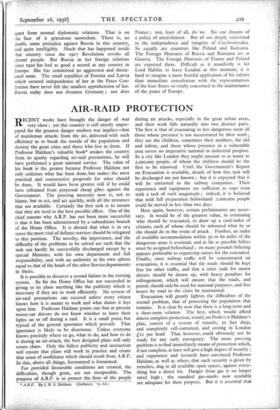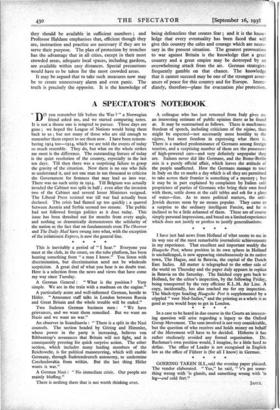AIR-RAID PROTECTION
RECENT weeks have brought the danger of war very close ; yet this country is still utterly unpre- pared for the greatest danger modern war implies—that of murderous attacks from the air, delivered with such efficiency as to break the morale of the population and destroy the great cities and those who live in them. If Professor Haldane's valuable book* awakes the country from its apathy regarding air-raid precautions, he will have performed a great national service. The value of his book is -the greater because Professor Haldane not only criticises what has been done, but makes the most practical and constructive proposals for what should be done. It would have been greater still if he could have refrained from perpetual cheap gibes against the Government. The pressing necessity now is, not to blame, but to act, and act quickly, with all the resources that are• available. Certainly the first task is to ensure that they are used to the best possible effect. One of the chief reasons why A.R.P. has not been more successful is that it has been administered by a subordinate branch of the Home Office. It is absurd that what is in ore sense the most vital of defence services should be relegated to this position. The novelty, the importance, and the difficulty of the problems to be solved are such that the task can hardly be successfully discharged except by a special Minister, with his own department and full responsibility, and with an authority in his own sphere equal to that of the heads of the other Service departments in theirs.
It is possible to discover a second failure in the existing system. So far the Home Office has not succeeded in giving to its plans anything like the publicity which is necessary if they are to work efficiently. No system of air-raid precautions can succeed unless every citizen knows how it is meant to work and what duties it lays upon him. Professor Haldane points out that at present motor-car drivers do not know whether to leave their lights on or off during a raid. It is a small point, but typical of the general ignorance which prevails. That ignorance is likely to ' be disastrous. Unless everyone knows precisely where to go, what to do, and how to do it during an air-attack, the best designed plans will only create chaos. Only the fullest publicity and instruction will ensure that plans will work in practice and create that sense of confidence which should result from A.R.P. In this, above all things, forewarned is forearmed.
For provided favourable conditions are created, the difficulties, though great, are not insuperable. The purpose of A.R.P. is to protect the lives of the people A.R.P. By J. B-. S. Haldane. (Gollancz. 7s. 6d.) during air attacks, especially in the great urban areas, and their work falls naturally into two distinct parts. The first is that of evacuating to less dangerous areas all those whose presence is not necessitated by their work ; they are the children, sometimes their mothers, the old and infirm, and those whose presence in a vulnerable area serves no imperative national or industrial purpose. In a city like London they might amount to as many as 2,000,000 people, of whom the children should be the first to be removed. Until the Government's Report on Evacuation is available, details of how this task will be discharged are not known ; but it is expected that it will be entrusted to the railway companies. Their experience and equipment are sufficient to cope even with a task of such magnitude ; indeed, it is believed that with full preparation beforehand 2,000,000 people could be moved in less than two days.
Here again, however, certain preliminaries are neces- sary. It would be of the greatest value, in estimating who should be evacuated, to draw up a card-index of citizens, each of whom should be informed what he or she should do in the event of attack. Further, an index of available accommodation within 50 or 6o miles of the dangerous areas is essential, and as far as possible billets must be assigned beforehand ; on many grounds billeting appears preferable to organising camps for the evacuated. Finally, since railway traffic will be concentrated on evacuation, it is essential that the roads should be kept free for other traffic, and that a strict code for motor drivers should be drawn up, with heavy penalties for infringement, which will ensure that the roads, and petrol, should only be used for national purposes, and free access by road to the cities be maintained.
_ Evacuation will greatly lighten the difficulties of the second problem, that of protecting the population that remains. It is clear by now that there is a long-term and a short-term solution. The first, which would afford almost complete protection, would, on Professx Haldane's plan, consist of a system of tunnels, 50 feet deep, and completely self-contained, and costing in London EH per head. That, however, could obviously not be ready for any early emergency. The more pressing problem is to find immediately means of protection which, if not complete, at least will give a high degree of security ; and experience and r'esearch have convinced Professor Haldane, as well as others, that such security is given by trenches, dug in all available open spaces, against every- thing but a direct hit. Danger from gas is no longer rated high ; the standard gas-masks now available are adequate for -their purpose. But it is essential that they should be available in sufficient numbers ; and Professor Haldane emphasises that, efficient though they are, instruction and practice are necessary if they are to serve their purpose. The plan of protection by trenches has the advantage that in all cities, except in their most crowded areas, adequate local spaces, including gardens, are available within easy distances. Special precautions would have to be taken for the most crowded areas.
It may be argued that to take such measures now may be to create unnecessary alarm and even panic. The truth is precisely the opposite. It is the knowledge of being defenceless that creates fear ; and it is the know- ledge that every eventuality has been faced that will give this country the calm and courage which are neces- sary in the present situation. The greatest provocation to war against Britain is the knowledge that a great- country and a great empire may be destroyed by an overwhelming attack from the air. German strategist-, frequently gamble on that chance. The knowledge that it cannot succeed may be one of the strongest assur- ances of peace for this country and for Europe. Imme- diately, therefore—plans for evacuation plus protection.











































 Previous page
Previous page